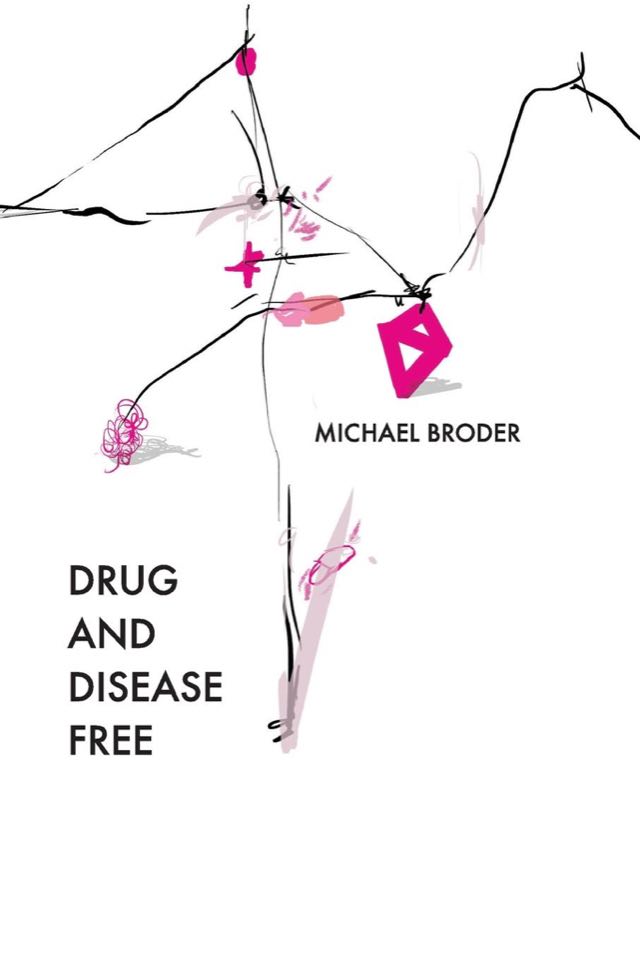Drug and Disease Free
— Logan February
Drug and Disease Free is a book plentiful in revelation, and, more significantly, Michael Broder is an excellent storyteller. He approaches and unravels the book’s narrative structure with unique wit, candor and humor, and with each reading, there is even more to unpack.
Broder’s craft exposes the reader to the layers of understanding held within the borders of language. The first poem, ‘Atonement,’ opens thus:
Because it is about blame, and I blame you—
for missing the subway, getting there late, having a bad time.
Right away, there is the vivid intimacy of everyday objects in the speaker’s life. We know it is about blame—in a world where bad things just happen,
our speaker must reach for someone, though he confides: I had only myself to blame.
So, it becomes clear that it is, in fact, not about blame at all, but about companionship and its role in a difficult life. Broder closes the poem by writing:
I blame you, and you are blamed, and there you lie,
sleeping like an angel, guilty as the devil, and I love you and I am free.
The work is laden with wit and the cherishing of mundane things, but it would, however, be negligent to continues without saying that Drug and Disease Free is also a book with heavy aches. The skill of Broder’s storytelling makes the collection one of the few where death is fully present, but without the foreboding shadow it tends to cast. There is a joy in the chronicling, a sense of freedom that has been created by undoing the knot of time around the dark events in the narrative.

Broder writes about the AIDS epidemic, getting infected and diagnosed, whilst also dealing with the speaker’s love and loss through it all. To do this, his speaker works his way backwards through time: before love’s whisper lulls the world’s chaotic roar,
there is the chaos and confusion and uncertainty of a time the poet refers to as the Plague Years.
Broder creates many intricate layers of nuance in this collection. The sheer span of emotion and empathy, as well as his gift for controlling each poem’s tone, is what carries the work and makes it something special. In ‘Standing Before The Ark,’ the speaker is both pensive and relieved in the discovery of having the infection. When Broder writes I am becoming what I will be,
it speaks not only to the resignation of living a poz life, but to the collection itself, and its chronological order: we can interpret what I will be
as free, because the reader is furnished with a knowledge of what the future holds for this speaker, which is a full life, undefined by the current turmoil of diagnosis. With this collection, Broder cultivates hope in a canon where it is relatively uncommon.
And though there are, of course, the elegies, their damping weight is offset by a reminiscing (and celebration) of the speaker’s younger, pre-diagnosis days. The collection goes further into the past, and we witness the (sometimes violent) awkwardness of navigating his adolescent sexuality:
I couldn’t stay hard for you,
no matter how many times we tried
‘Fall 1981’ narrates the speaker’s first time with a complete stranger—because he just wanted to fuck someone, / to know, finally, what that was like.
Broder again displays his adeptness at bringing humor into poetry when he writes: I lay / on the living room carpet and the dog came over / and sniffed my crotch, and I thought my God, he knows.
Most of all, in the space of freedom, Broder and his collection give life to a perspective which is very real, but which, for the most part, goes unwritten of: love in a serodiscordant relationship. In ‘October 18, 1990,’ one of many love poems in the volume, he writes: Loving me, you had no choice / but to make good use of my infection.
The craft in Drug and Disease Free, is so impressive that its freedom almost feels like it belongs to you, in whatever way you need it most.